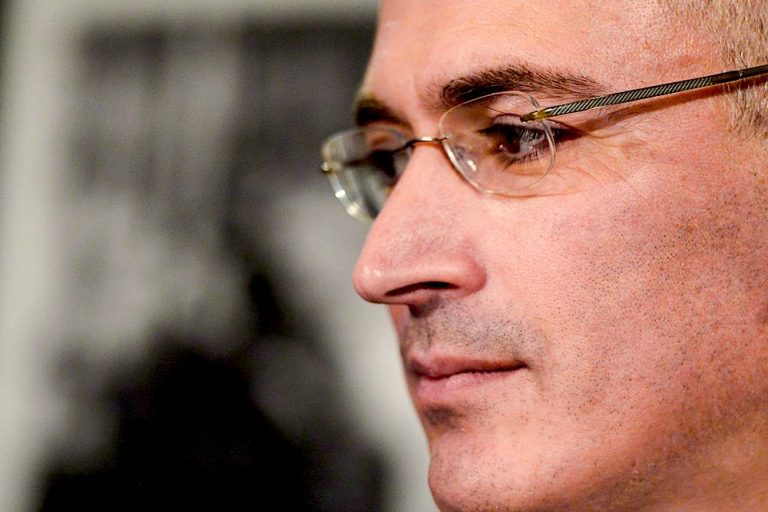by DIANA JOHNSTONE
 Khodorkovsky: Interfering in U.S. politics. PHOTO/Wikimedia Commons
Khodorkovsky: Interfering in U.S. politics. PHOTO/Wikimedia Commons
If Russia were trying to interfere in U.S. domestic politics, it wouldn’t be attempting to change the U.S. system but to prevent it from trying to change Russia’s.
The Cold War between the United States and the Soviet Union was ostensibly a conflict between two ideologies and two socio-economic systems.
All that seems to be over. The day of a new socialism may dawn unexpectedly, but today capitalism rules the world. At first glance, it may seem to be a classic clash between rival capitalists. And yet, once again an ideological conflict is emerging, one which divides capitalists themselves, even in Russia and in the United States itself. It is the conflict between American unipolar dominance and a multipolar world.
The defeat of communism was brutally announced in a certain “capitalist manifesto” dating from the early 1990s that actually proclaimed: “Our guiding light is Profit, acquired in a strictly legal way. Our Lord is His Majesty, Money, for it is only He who can lead us to wealth as the norm in life.” The authors of this bold tract were Mikhail Khodorkovsky, who went on to become the richest man in Russia (before spending ten years in a Russian jail) and his business partner at the time, Leonid Nevzlin, who has since retired comfortably to Israel.
Loans for Shares
Those were the good old days in the 1990s when the Clinton administration was propping up Yeltsin as he let Russia be ripped off by the joint efforts of such ambitious well-placed Russians and their Western sponsors, notably using the “loans for shares” trick.
In a 2012 Vanity Fair article on her hero, Khodorkovsky, the vehemently anti-Putin journalist Masha Gessen frankly summed up how this worked:
“The new oligarchs—a dozen men who had begun to exercise the power that money brought—concocted a scheme. They would lend the government money, which it badly needed, and in return the government would put up as collateral blocks of stock amounting to a controlling interest in the major state-owned companies. When the government defaulted, as both the oligarchs and the government knew it would, the oligarchs would take them over. By this maneuver the Yeltsin administration privatized oil, gas, minerals, and other enterprises without parliamentary approval.”
This worked so well that from his position in the Communist youth organization, Khodorkovsky used his connections to get control of Russia’s petroleum company Yukos and become the richest oligarch in Russia, worth some $15 billion, of which he still controls a chunk despite his years in jail (2003-2013).
His arrest made him a hero of democracy in the United States, where he had many friends, especially those business partners who were helping him sell pieces of Yukos to Chevron and Exxon. Khodorkovsky, a charming and generous young man, easily convinced his American partners that he was Russia’s number one champion of democracy and the rule of law, especially of those laws which allow domestic capital to flee to foreign banks, and foreign capital to take control of Russian resources.
Vladimir Putin didn’t see it that way. Without restoring socialism, he dispossessed Khodorkovsky of Yukos and essentially transformed the oil and gas industry from the “open society” model tolerated by Yeltsin to a national capitalist industry. Khodorkovsky and his partner Platon Lebedev were accused of having stolen all the oil that Yukos had produced in the years 1998 to 2003, tried, convicted and sentenced to 14 years of prison each. This shift ruined U.S. plans, already underway, to “balkanize” Russia between its many provinces, thereby allowing Western capital to pursue its capture of the Russian economy.
Consortium News for more